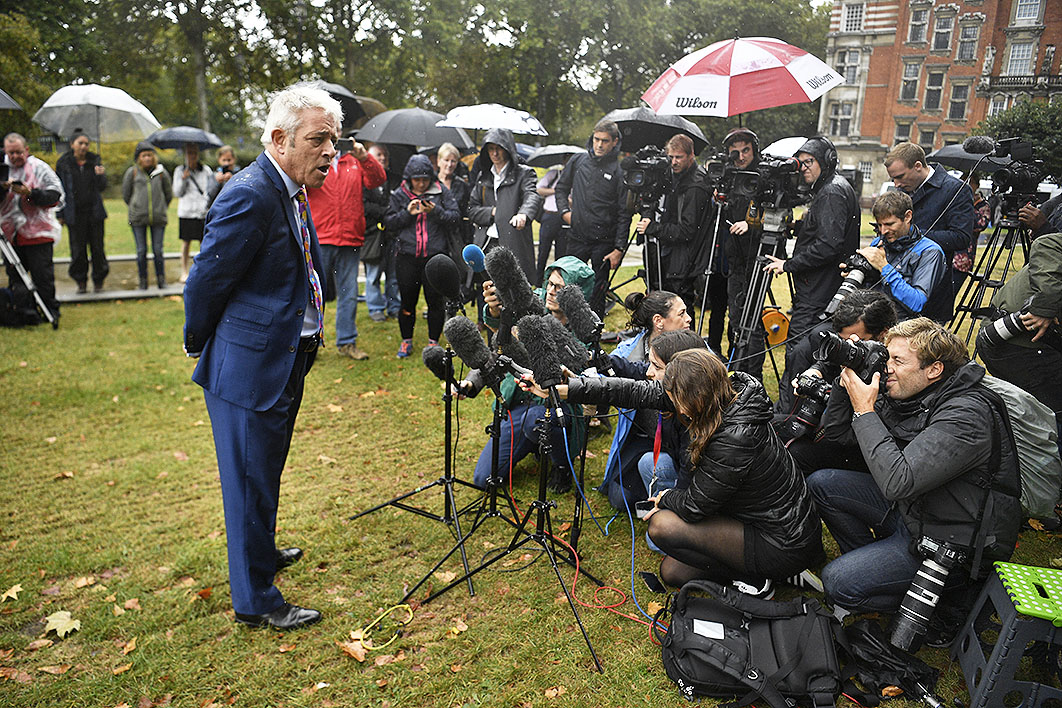Boris Johnson is no Gough Whitlam. But in making sense of a judicial coup that corners a prime minister, stupefied Brits might today seek one instant lesson in the Australian giant’s 1975 dismissal. The UK Supreme Court’s ruling that Johnson’s request that Queen Elizabeth grant a five-week proroguing of parliament was “unlawful, void, and of no effect” will reverberate for decades. As soon as Brenda Hale, the court’s president, finished reading a summary of the eleven judges’ lucid — and unanimous — verdict, it was clear that 24 September 2019 will also be long cited as a landmark constitutional moment.
In which direction this moment leads is less sure, however. Above all, that’s because the judgement is also a deeply political one, with its timing and character inevitably embroiled in the bitter national debate about Brexit. The gleeful partisanship of its backers outside the court — jostling for the cameras to pour anathemas on Johnson and advance their favourite anti-Brexit solution — was stark evidence.
So was the reaction of Britain’s semiofficial historians, pumped up with now rather formulaic gravitas. The national treasure Peter Hennessy welcomed “one of the greatest days in the history of the British constitution,” excoriated Johnson for “insensitivity and illegitimacy towards the Queen” in requesting the suspension — and called for a written constitution, which is rapidly becoming the new orthodoxy.
Equally striking was the personalised adulation of Lady Hale, who had just cited a 1611 precedent to the effect that “the King hath no prerogative but that which the law of the land allows him.” The reference is doubtless to Johnson rather than Elizabeth Windsor, the Bill of Rights and regime change of 1688–89 having taken the state beyond absolutism. But as with Hennessy’s commending the judges for “penetrating the most intimate part of the UK state — the monarch-prime minister relationship,” it’s plain to see that today’s judicial interventionism and its ecstatic embrace are inseparable from the campaign to render illegitimate the United Kingdom’s departure from the European Union.
Indeed, the Supreme Court case itself was part of that campaign. It follows three others in English, Northern Irish and Scottish lower courts initiated by anti-Brexit MPs and activists, the first two of which failed. The judges held that Johnson’s proroguing of parliament was designed to silence it in the crucial period before 31 October, when Brexit falls due, and thus was a democratic outrage. In the Supreme Court’s words, the move “prevented [parliament] from carrying out its constitutional functions for no good reason.”
Johnson’s advisers responded that the current parliamentary session is the longest since the 1640s; that the government needed room to conclude a deal with the European Union (with which, it could scarcely add, opposition members were colluding); that a suspension was routine during the party conference season; and that only five extra days were at issue before parliament was anyway to return on 14 October. Nonetheless, the court, having received a forensic submission from barrister David Pannick representing lead appellant Gina Miller, held that “the effect [of proroguing] on the fundamentals of our democracy was extreme.”
What is also extreme is the formalism of this judgement. It could only be reached by ignoring the House of Commons’s degeneration — taking its lead from John Bercow’s speakership, and amid Brexit’s three-year paralysis — into a theatre of narcissism. The court cannot countenance the brutal fact that Brexit has become a raw struggle for power, in which it is now not just referee but player.
Even before the legal cases, Johnson was charged with attempting a coup in planning to leave the EU by the agreed (and twice-postponed) deadline of 31 October. When his slim majority vanished as Conservative MPs defected or rebelled, the opposition cohered to pass a law requiring the government to ask the European Union for yet another extension and accept without demur Brussels’s timing and terms. Johnson pressed for a general election, but MPs — Labour, Liberal Democrats, Scottish and Welsh nationalists, independents, Greens, dissenting Tories — stymied this, as they feared Johnson would win and implement Brexit. Given that the people voted to leave the European Union in 2016, whose is the coup against democracy?
Then, at the moment of proroguing, Bercow’s permissive belligerence overflowed. Many MPs boycotted the ceremony in the neighbouring House of Lords, instead staging a demo in the Commons around his chair, posting selfies and singing political hymns. MPs’ social media posturing is now a more urgent concern than breaking the country’s deadlock, and the Supreme Court has vindicated them. Such judicial overreach, opening a new front in the anti-Brexit strategy, will make Britain’s polarisation all the more intractable.
At heart this is a political crisis, not a legal one. The evasion of that reality requires an unrelenting effort to cancel or censor the past “as it really was” (messiness and all) in favour of an approved, self-satisfying version. I am reminded here of a scene in The Ploughman’s Lunch, Ian McEwan’s second film partnership with director Richard Eyre. Begun in 1981, two years into Margaret Thatcher’s era, its motif — politics and commerce’s manipulation of history — would be vitalised by her South Atlantic war with Argentina in 1982, which the work cleverly incorporates.
The film portrays a cynical young mover through the newly porous silos of media, advertising, publishing and academia who plans a revisionist, pro-establishment account of the long discredited British–French–Israeli invasion of Suez a quarter century earlier. Its social lens, reaching from patrician gatekeepers to a women’s peace camp, probes deep and with scalpel precision. Its title, an adman’s boast of how the fake rurality of a cheese, pickle and crusty-bread combo lured customers into failing pubs — “a completely successful fabrication of the past” — was triply effective. It identified a source of regenerating power and acknowledged its meretricious appeal, yet proposed no easy route for those who might wish to resist its charms. The work’s bleak prescience still resonates.
At one point James, our antihero, visits a country house to collect grist for his mill. There he encounters a precocious little swot who offers to recite a chronology of the kings and queens of England. Six centuries in, a breathless shift from Charles I to Charles II — in reality separated by a civil war, a war of three kingdoms, and a revolution — triggers James to a mild query about the interregnum decade: “What about the Cromwells?” Instantly, the proto-Rees-Mogg sprog retorts: “They don’t count.”
This week McEwan, who in 2017 welcomed a death-harvest of ageing leavers and their replacement by enlightened young remainers, publishes a smug Brexit satire (The Cockroach) and describes leaving the European Union as “self-harmingly loony.” Every day in Britain, you can quite randomly encounter similar views from a dozen cultural panjandrums, often looking down from a great height at what they candidly imagine — vilely, and wrongly — to be an ignorant, racist, empire-obsessed mass: their fellow citizens.
Three years ago these citizens turned out to vote on a declared once-in-a-lifetime issue and were promised their choice would be enacted. Now they, and their votes, don’t count. Once, self-styled democrats might have spoken up for them. No longer. And you wonder why Britain is divided? •




